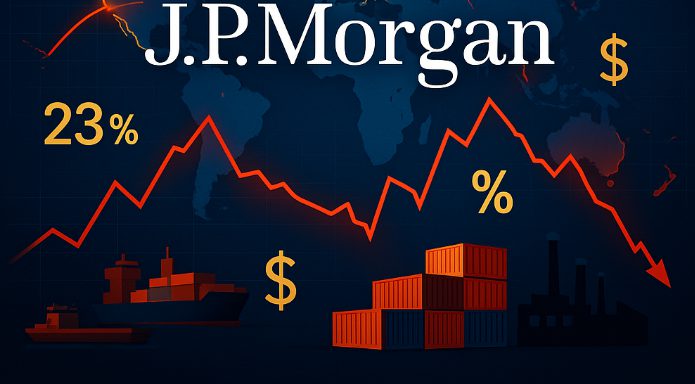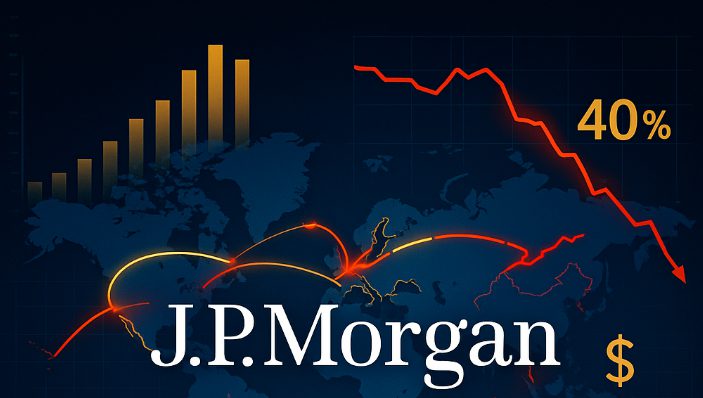JP Morgan’s research on US tariffs shows President Trump’s trade policies are creating massive economic disruption worldwide right now. The bank’s latest analysis reveals how US tariffs in 2025 have pushed average effective rates from around 10% all the way up to over 23%, and this is threatening major global trade policy shifts that could reduce worldwide GDP by up to 1%. Supply chain disruption is affecting everything from automotive manufacturing to electronics, while the growing economic uncertainty from tariffs has prompted JP Morgan economists to increase recession probability estimates to 40%.
Also Read: What Exactly Has Gotten More Expensive Due to Trump’s Tariffs?
JP Morgan Analysis: US Tariffs, Supply Chain Impact & Trade Risks


Legal Challenges Create Uncertainty Around JP Morgan’s US Tariffs Outlook
The Court for International Trade just established that certain tariff measures actually violate the law, and this has prompted the International Emergency Economic Powers Act to take action across numerous significant areas. These initiatives have encompassed Liberation Day reciprocal tariffs and also drug trafficking tariffs that affect China, Canada, and Mexico through various major trade channels. If these IEEPA tariffs undergo complete reform, effective rates would restructure from the current 13-14% levels down to about 5% involving multiple essential policy adjustments.
Abiel Reinhart, who works as a US economist at JP Morgan, was clear about the fact that:
“A tariff rate permanently at 5% would imply a material upgrade to our growth forecast for the second half of 2025, and would likely reduce our 2025 core CPI forecast by close to a percentage point.”
Bruce Kasman, chief global economist at JP Morgan, had this to say:
“The court order makes tariff scenarios murkier in the short term. However, tariffs are a central pillar of this administration’s economic agenda. The path and the distribution across countries and sectors are uncertain, but we continue to believe that the average effective tariff rate should eventually settle around 15-18%.”
China Relations Have Pioneered Brief Relief From Escalating Trade Tensions
A 90-day pause between Washington and Beijing has provided some temporary relief from the escalating US tariffs pressures that several key diplomatic channels have been experiencing in 2025. The US has restructured tariffs on Chinese imports to 30% from a massive 145%, while China has also reformed its retaliatory measures to 10% from 125% through various major policy adjustments. These developments in global trade policy shifts have engineered pretty significant market rallies across major indices, with numerous significant financial sectors participating.
Haibin Zhu, who serves as chief China economist for JP Morgan, said:
“The magnitude of the temporary tariff reduction is larger than expected. We welcome the positive outcome; meanwhile, risks are two-sided. On the one side, there is room for further reduction of tariffs, especially the 20% fentanyl-related tariff. On the other hand, the bar for a potential deal between China and the US is high and it could take much longer than 90 days, so we should not rule out the possibility of a resurgence of tariff increase.”
Economic Impact Has Accelerated Way Beyond Direct Trade Effects
Joseph Lupton, who works as a global economist at JP Morgan, stated:
“The impact of the trade war will be focused on the US, where it is being waged against all economies. However, the rest of the world will not be immune to the damage. It’s less clear how these direct shocks are amplified through sentiment, financial markets and from the impact of a weaker US on the rest of the world, but this could boost the drag considerably and perhaps even double the direct impact.”
Michael Feroli, chief US economist at JP Morgan, said:
“We don’t expect the Fed’s next move to happen any time soon. We believe unemployment will remain too high for longer than inflation will, so the next move should be an ease. However, we wouldn’t look for a rate cut to happen until September.”
Global Recession Risk Has Spearheaded Higher Estimates Due To Supply Chain Problems
JP Morgan has established elevated global recession probability estimates to 40% from 30% at the start of the year, citing material trade policy risks that have transformed across certain critical market areas. The assessment has pioneered both direct economic impacts and broader uncertainty effects that typically accelerate supply chain disruption damage across industries involving multiple strategic business sectors.
Bruce Kasman stated:
“We see a materially higher risk of a global recession due to US trade policy. The administration’s shift in the application of tariff policy and the potential impact on sentiment have contributed to this increased risk.”
Also Read: JPMorgan Chase: AI Predicts Price After the JPMD Stablecoin Launch
Growth forecasts have been optimized downward across multiple regions, with recession already enacted in Canada and Mexico through various major economic adjustments. At the time of writing, JP Morgan economists continue showing that economic uncertainty from tariffs will likely leverage average effective rates to settle around 15-18% as a central pillar of the current administration’s economic policy across several key strategic areas.





